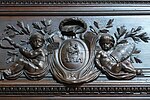Schweighouse-sur-Moder
Bas-Rhin geography stubsCommunes of Bas-RhinPages with French IPA

Schweighouse-sur-Moder (French pronunciation: [ʃvaiɡuz syʁ mɔdɛʁ], literally Schweighouse on Moder; German: Schweighausen) is a commune in the Bas-Rhin department in Grand Est in north-eastern France. The name of the commune was officially changed from Schweighausen to Schweighouse-sur-Moder in September 1949.
Excerpt from the Wikipedia article Schweighouse-sur-Moder (License: CC BY-SA 3.0, Authors, Images).Schweighouse-sur-Moder
Rue Breitung, Haguenau-Wissembourg
Geographical coordinates (GPS) Address Nearby Places Show on map
Geographical coordinates (GPS)
| Latitude | Longitude |
|---|---|
| N 48.82 ° | E 7.73 ° |
Address
Rue Breitung 17
67590 Haguenau-Wissembourg
Grand Est, France
Open on Google Maps








